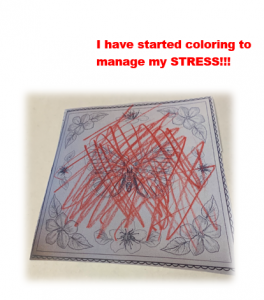
MONITORING DURING COVID-19 TO FLATTEN THE CURVE
Monitoring during COVID-19 to flatten the curve; let’s focus on what we can do.

Monitoring during COVID-19 to flatten the curve; let’s focus on what we can do.

The goal of National Healthcare Decision Day is to inspire Americans to communicate their end-of-life wishes about healthcare with their families and healthcare providers.
Although making healthcare decisions is often a difficult process, making decisions for others is even more complicated.
According to the 2018 Conversation Project national survey, Americans are becoming more comfortable talking to their loved ones about their end of life wishes. Over half (53%) of Americans say they would feel relieved if a loved one started “the Conversation.”
Once you have initiated the conversation, experts recommend creating an advance care directive. Advance care directives are legal documents that are used to secure your decisions about end-of-life care, to avoid confusion and uncertainty later on. These legal documents can include a living will, health care proxy, health care power of attorney or instruction directive. Having an advance care directive in place will help make sure that your wishes about your health care are fulfilled, even if you are no longer able to communicate your wishes.
Don’t wait for “the right time” to talk with your family, everyone should plan for their future, before a crisis arises.
There are many tools and online resources that can help you and your family begin this important conversation.
To learn more about National Healthcare Decision Day and advance care directives. Visit NHDD.org.

Make the pledge Tuesday, December 3rd to Dine In for better health – physical, social, and cultural.
Most of us eat every day without thinking about it. We need to eat to nourish our body, so it’s just a regular thing we do. But eating also can be an important social and cultural way for families to come together.
When we eat together as a family, it gives us the opportunity to practice cultural traditions and share food histories. We get the chance to explore new foods and learn new skills – like eating with chopsticks. We may get the chance to learn and practice table manners and learn literary and conversation skills. Paul Fieldhouse of the Vanier Institute of the Family says, “For young children, ‘table talk’ may be the main source of exposure to family conversation and the expression of thoughts, ideas, and emotions.” Eating the family meal also can help us de-stress by setting a reassuring rhythm and structure to our day.
Eating family meals at home has additional benefits. The University of Washington found that families who cook and eat more often at home tend to eat a healthier diet. Their Healthy Eating Index is high – meaning they eat more fruits and vegetables and less calories, sugar, and fat. They eat smaller portions helping to regulate weight. Some research suggests we eat smaller portions at home because we eat more slowly and talk more. This, however, does not equate to a higher cost. Meals cooked at home generally cost less than those eaten out.
So, how can your family eat more meals together at home?
Resources:
(Still) Eating Together: The Culture of the Family Meal. Retrieved November 16, 2019 from https://vanierinstitute.ca/eating-culture-family-meal/
Cooking at Home Tonight? It’s Likely Cheaper and Healthier. Retrieved November 15, 2019 from https://www.sciencedaily.com/releases/2017/03/170314150926.htm

Have you ever been bullied or know someone who has been bullied? I know I have. October is National Bullying Prevention Month. Each October since 2006, there has been a national effort to raise awareness about bullying and provide education and resources to try to prevent it. According to data from 2017, about 20% of youth ages 12-18 experienced bullying at school and nearly 30% reported cyberbullying during their lifetime. That is a lot of our country’s youth!
Bullying is unwanted aggressive behavior. Bullying must have a real or perceived power imbalance between the bully and the victim, where the bully uses their power to control or hurt their victim. The bullying behavior needs to be repeated over time, or at least have the potential to repeat over time.
There are three categories of bullying:

The constant and easy access of cell phones, social media, and the internet has increased the real dangers of cyberbullying. (Photo source: UF/IFAS)
Technology has changed the ways of bullying. Bullying is no longer only ‘picking on’ someone, making fun of them, calling them names, or ignoring them at school. The constant and easy access of cell phones, social media, and the internet has truly expanded bullying to an unthinkable, unending scale. There are many ways to bully someone online, including:
Perhaps one of the most dangerous things about cyberbullying is once something is posted online and is circulated, it’s very hard to permanently remove. This oftentimes makes escape from the bullying unusually difficult or even seemingly impossible. It’s so important to keep up with ways technology is advancing in order to protect ourselves from things like cyberbullying.
The negative psychological effects of bullying are very real – for the bully, the victim, and those who may witness it.
For the bully, they have a greater risk of using substances, engaging in risky or violent behavior, being abusive in future relationships, committing crimes, and developing other external behavior problems.
Effects of bullying include low self-esteem, fear, loneliness, heartache, and potential physical illness. These effects put a widespread toll on the mental, physical, and social health of the victims and also those who witness bullying. The increased risk of using addictive and illegal substances, anxiety, depression, eating disorders or even becoming suicidal are to be taken seriously and should be treated appropriately. Seek out mental health professionals or physicians and consult with them on the best combination of treatment. These effects can last days, months, years, or even lifetimes depending on the person and the circumstance.
The story of Amanda Todd is an unfortunate real example of cyberbullying and how unforgiving and never-ending it can be. Amanda ultimately committed suicide to get away from it; she was only 15 years old. Her YouTube video, published in 2012 a month before she committed suicide, has 13.5 million views to date. To better understand the reality of bullying, please consider watching it or sharing it. However, viewer discretion is advised.
Bullying, harassment, discrimination, or any other type of negative, cruel, or harmful behavior is never okay or acceptable in any way. If you have been a witness of bullying or a bully, stand up to stop it! If you have been bullied or know someone who has, please seek help from caring professionals, family, or friends. Go-to resources are found below.
Stop Bullying Now Hotline: 1-800-273-8255
National Suicide Prevention Lifeline: 1-800-273-8255
The Trevor Project: 1-866-488-7386
National Eating Disorders Association: 1-800-931-2237
Sources
National Center for Educational Statistics, Indicators of School Crime and Safety Indicator 10: Bullying at School and Electronic Bullying, April 2019.
Cyberbullying Research Center
The Amanda Todd Legacy

 What is Stress Anyway?
What is Stress Anyway?The traffic is awful, a report is due, the laundry is piling up, and the kids are fighting. Life is full of stress! According to the National Institute of Mental Health, stress is how the brain and body respond to any physical, mental, and/or emotional demand. Not all stress is bad. For example, stress can help motivate us to get things done. When faced with a threat or stressful event, our bodies produce hormones such as epinephrine, which can cause a temporary rise in our heart rate and blood pressure. Chronic, un-managed stress can cause long-term symptoms including headaches, high blood pressure and even problems sleeping.
Identify the Sources of Stress in Your Life
Feeling stressed is normal, but some people cope with stress better than others. Our thoughts, lifestyle and emotions can affect how much stress we endure. We must identify the causes of our stress before we can begin to manage them. Although the causes of stress are similar for both men and women, it is how we recognize and manage our stress that makes us different.
Common Causes of Stress:
• Work or unemployment
• Money, finances
• Drug or alcohol abuse
• Family breakdown
• Health issues
• Major life changes
Our bodies automatically respond to stressors in our lives. However, constant and uncontrolled stress can lead to serious physical and mental consequences. No matter how stressful your life seems, we must recognize the warning signs of stress and take action.
Watch out for the following warning signs:
• Feeling tired, not sleeping properly
• Loss of concentration and an inability to complete projects
• Irritability, low self-esteem or mood swings
• Feeling tense or anxious
• Feeling unmotivated
• Withdrawing from family and friends
• Excessive drinking and/or drug use
• Physical signs such as headaches, chest pains, high blood pressure, digestive problems or aches and pains
How stress affects you may depend upon your gender. Men and women recognize and react to stress in different ways, both mentally and physically.
When feeling stressed, women reach out to friends and family. They seek support to lower their stress and find a solution to their challenges. By talking about their emotions, women are able to process their feelings and share the pressure of their situation.
When men experience stressful situations, they are likely to hide their feelings or change the subject to escape a stressful situation. Men find it hard to talk about their feelings or ask for help when faced with pressures from their job, family issues or money worries. Men prefer to play sports or listen to music to manage stress.
Stress Reduction Strategies for Men and Women
Stress is a normal part of life, but chronic stress can be bad for our health. Stress management means taking control of your thoughts, emotions, and lifestyle. Making simple changes in your life such as maintaining a network of close friends, exercising, eating a healthy diet, and getting enough sleep can help reduce your overall stress.
Resources:
The American Psychological Association: https://www.apa.org/news/press/releases/stress/2010/gender-stress
The National Institute of Mental Health: https://www.nimh.nih.gov/health/publications/stress/index.shtml
The Electronic Data Information Source of UF/IFAS Extension. EDIS: https://edis.ifas.ufl.edu/pdffiles/FY/FY51700.pdf
To learn more about how to cope with stress, contact Laurie Osgood, Family and Consumer Sciences Agent at the UF/IFAS Extension Office in Gadsden County (850) 875-7255 or Osgoodlb@ufl.edu